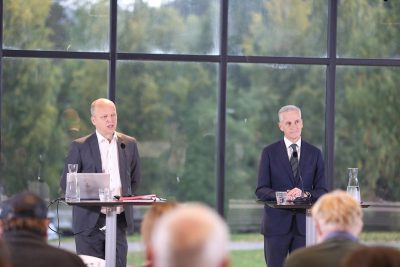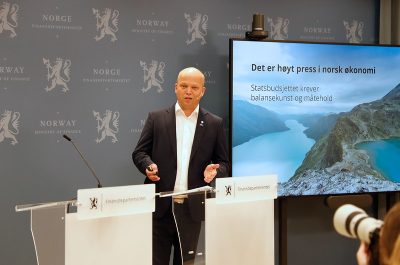Norway’s left-center minority government unveiled a proposed and “tight” state budget for next year that marks a major move towards redistribution of income. It’s likely to leave many disappointed, even angry, but was generally welcomed by its key support party in Parliament, the Socialist Left, and the Reds.

“While earlier governments have glossed over social differences and recognized unorganized labour, the Labour-Center government is talking about reducing social differences, both socially and geographically, and strengthening organized labour,” said Bjørnar Moxnes, leader of the Reds Party. “That’s a good starting point.”
Audun Lysbakken, leader of the Socialist Left (SV), has wanted a budget that would “address our most important challenges over the next months and years, (like) rising prices and social differences, the climate crisis and solidarity with the Ukrainians’ fight for freedom.” He indicated after the budget handover that SV wants even higher taxes on wealthy individuals and profitable companies, and he was “disappointed” by the government’s “environment budget,” but looks forward to looming budget negotiatons.
The government needs support from SV to get its budget through Parliament, and may need to toughen climate measures in order to do so. SV firmly opposes oil industry tax incentives and wants to halt more offshore oil and gas exploration, while Labour and Center want to keep the industry pumping and even expanding, now pointing to Europe’s need for Norwegian oil and gas. The government did, however, introduce measures to boost carbon taxes by 21 percent over price hikes in general, and proposes “tax changes” that could demand another NOK 2 billion from the oil and gas industry.
New and higher taxes loom
The budget itself is claimed to be “tighter” than it’s been in years, with Finance Minister Trygve Slagsvold Vedum arguing that Norway can’t simply siphon off more oil and gas revenues to cover a budget deficit for fear of overheating the economy. Instead of dipping more deeply into the country’s sovereign wealth fund (known as the Oil Fund) to balance the budget, Vedum and Prime Minister Jonas Gahr Støre are proposing to only spend 2.5 percent of it in 2023, instead of the 3 percent that’s currently allowed.

That means they’ll pad the state budget with NOK 316.5 billion from the Oil Fund, still higher than in pre-Corona years but NOK 18.3 billion less than this year. They intend to more than make up for the difference by introducing highly controversial new taxes on electricity producers, fish farming and salmon producers, and other highly profitable companies. They also want to raise the taxes all employers must pay for each employee, now specifically on those who are paid more than NOK 750,000 a year. All told, taxes levied on private businesses may collectively rise by as much as NOK 27 billion.
Income taxes will also likely rise for everyone earning more than NOK 750,000 (USD 75,000) a year and especially for the wealthiest Norwegians. Taxes on stock dividends will rise and the country’s notorious annual tax on net worth (called formueskatt) is set to rise to a full 1 percent. That may not sound like much, but it can quickly amount to thousands of kroner a year, especially for retirees who have no debt and are taxed on the market value of their homes and other assets but otherwise live on fixed incomes.
Norwegians earning less than NOK 750,000 are due some tax relief but perhaps not as much as expected. Vedum himself said a household earning NOK 550,000 would save NOK 7,000 in taxes, an amount one local consumer economist for Norway’s biggest bank, DNB, called “crumbs.”
Støre has said he expects lots of “noise” over the budget from critics. “Shifting power in society never happens without friction and some noise,” he told his own Labour Party members at their national meeting in September. “A more fair tax system challenges those with means who don’t want to contribute more to society. We have to be prepared for that.” A new public opinion poll this week indicates the noise has already started, with the government parties’ popularity tumbling and the conservative opposition parties gaining a majority if an election were to held now.
In addition to raising Norway’s highly controversial annual tax on net worth, the government has already introduced or raised taxes on personal use of a company’s assets. Norwegians who own aircraft, boats or real estate through their companies but use them for private use can now expect some big tax bills. New tax rules will assess personal taxes against the companies’ shareholders if the companies they control own such assets, to the tune of 26 percent of the value of homes or holiday homes and full value or even more of boats, helicopters or private jets. One top tax attorney in Oslo told newspaper Dagens Næringsliv (DN) that “there will probably be some private planes put up for sale soon.”

Some of this has been flagged as the reason Norway’s wealthiest resident, Kjell Inge Røkke, recently moved to Switzerland. Several other Norwegian billionaires have followed, although newspaper Aftenposten reported this week that only 64 of Norway’s 2,700 wealthiest citizens have left the country in the past decade. Moving activity has risen, however, since the Labour-Center government took power last fall.
This is the new government’s first state budget, and both parties also wanted to provide some tax relief to those with moderate and low incomes, especially now that they’re getting hit hardest by huge electricity bills, rising food prices and the highest overall inflation in years. SV has never been keen on tax relief, raising objections from Labour. Tough negotiations loom.
There’s widespread support, however, for higher taxation of some of Norway’s most profitable industries, while most agree that “the party is over” after years of expansive state budgets padded with oil revenues. Støre and Vedum now want to more carefully preserve “Norway’s piggy bank” for future generations’ pensions, and establish new sources of state income now.

Many plans to launch new projects like more subsidized dental care, various cultural ventures, major highway improvements or new public buildings have been put on ice. Some budgets are being cut (like those at the state public health institute FHI now that the Corona crisis has wound down) but initial reaction to the new budget questioned how “tight” the overall state budget really is.
Critics argued on Thursday that the government hasn’t set priorities like it claims, but is simply passing the public sector’s bill over from the Oil Fund to the public and private business, without cutting back enough on the public sector itself. Vedum admitted that the government didn’t want to cut budgets for the police, hospitals or other social services, and the government is even adding to them by offering free day care for a family’s third child and for many children in the far northern county of Finnmark, to help keep it populated. New programs aimed at troubled youth are also in the works.
Vedum based his first state budget on Norway’s still-strong economy, using an expected unemployment rate of just 1.7 percent. Economists warn that may rise, with several suggesting the Norwegian economy could quickly turn around. Inflation has already risen, unemployment may, too, and housing prices declined on average last month for the first time in years. Record-high electricity and gas prices also hit Norwegian consumers hard, with airlines even dropping routes this winter because of low ticket demand.
Vedum blamed his need to raise new tax revenues mostly on huge new costs tied to Russia’s war on Ukraine. Norway has joined its allies in sending billions worth of weapons and humanitarian aid, while also taking in thousands of Ukrainian refugees in Norway. Norway now also faces new security concerns, and the proposed state budget boosts defense spending next year by NOK 6.8 billion.

No one expected such huge increases would be needed in defense spending. While sales of Norway’s gas and electricity have skyrocketed, so have the government’s costs and military investment needs. Calls have also gone out for Norway to seed a huge new fund to help rebuild Ukraine when Russia’s war finally ends.
Vedum tried to explain all this at a pre-budget meeting with the press more than a month ago, part of the government’s strategy to lower public spending expectations. He used a photo of a steep mountain ridge in Norway known as Besseggen, over which runs a challenging trail that’s popular with hikers.
“Given the high tempo we’re seeing in the Norwegian economy, we can’t run over the edge,” Vedum said, “because it will be much more risky if we stumble.” Formulating the budget was “a demanding balancing act,” he said, that now will be debated for the next three months, with a decision needed before the Christmas holidays.
NewsinEnglish.no/Nina Berglund

